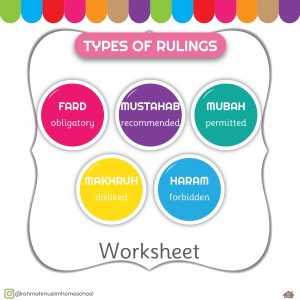 Islam is a complete way of life, which teaches us what we should and should not do. There are five rulings to help us to know what actions we have to do and we must stay away.
Islam is a complete way of life, which teaches us what we should and should not do. There are five rulings to help us to know what actions we have to do and we must stay away.
1. Fard means something that is obligatory. The one who does it is deserving of reward, the one who fails to do it is deserving of punishment. For example, pray five times a day and fasting in the month of Ramadan.
2. Mustahab is something that prophet Muhammad said, did or encouraged. It is recommended for Muslims. If we do them we are rewarded, if we do not we are not punished. For example, pray two rakaah before Fajr prayer and fasting three days of every month.
3. Mubah means something that is permitted to do. This act does not bring reward or punishment. For example, eating, drinking, buying and selling.
4. Makhruh is an act which is disliked by Allah. If we do not do these acts we will be rewarded, but if we do them there is no punishment. It is better to avoid them. For example, giving and taking with left hand, and women following funeral processions.
5. Haram is something that is forbidden. It is obligatory to refrain from doing it. If we avoid these acts we are rewarded if we do not we are punished. For example, drinking alcohol and disobedience to parents.
Download the worksheet here:
